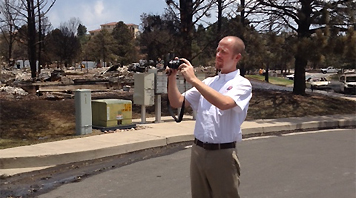|
RMIIA News Releases7951 E. Maplewood Avenue, Suite 110 Contact: Flash Floods Are Dangerous AND Damaging: Insurance Advice for Colorado Drivers & Homeowners September 12, 2013 – Relentless rains causing flash flooding from Boulder and Fort Collins through the Denver Metro area are not only dangerous, but will leave many people with flooded vehicles and homes. One of the most important messages is to put safety first by staying off the road if possible, and do NOT drive through standing water. If you have a sump pump in your home make sure it is running. Your car is covered for flood damage if you purchase optional "comprehensive" coverage. Flood insurance is not covered under a standard homeowners or renter's insurance policy, but it can be purchased through your insurance agent or company representative. Flood insurance must be in place 30 days in advance of the flood. "Flooding can cause total damage to vehicles in water past the wheel wells," says Carole Walker, Executive Director of the Rocky Mountain Insurance Information Association. "Flood damage to property will be covered if you carry a separate flood insurance policy. Homeowners and renters also need a separate flood insurance policy for damage to their personal belongings. If you have sewer back-up damage that is covered if you purchased an endorsement to your homeowners insurance policy." This is a wake-up call that homeowners, renters and businesses need to at least consider purchasing additional flood coverage. Flooding is the most common natural disaster in the U.S. and during the past 10 years, the average flood claim has amounted to over $33,000. Flood insurance is covered through policies purchased and handled through FEMA's National Flood Insurance Program (NFIP). Links to more information on flooding and flood insurance: DURING THE FLOOD
FILING AN AUTO INSURANCE CLAIM
For more consumer information on insurance topics, logon to www.rmiia.org. ### Rocky Mountain Insurance Information Association is a non-profit consumer information organization. Affiliated with the Insurance Information Institute, RMIIA has been serving consumers and the media since 1952. |
|
303-790-0216 • 800-355-9524 • Contact Us • Legal Notice, Disclaimer & Terms of Use
Home • About RMIIA • News Room • P&C Insurance Industry • Auto • Homeowners • Business • Catastrophes • Agent Resources • Events & Education • Brochures

